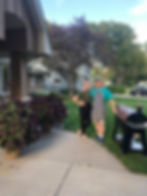“This is the breakout session on grief and loss. If that’s you, you’re in the right place,” the facilitator greeted us. Ten ladies sat in a semi-circle in the small-town church’s library. “How many of you are here because you’re supporting a person grieving?” One hand tentatively rose. “How many of you are here because you’ve experienced a loss?” Every hand went up. The facilitator asked for specifics. Hands raised to signify losses within the last one, two, five, and five-plus years.
My hand was up too. The breakout session at the local one-day women’s conference was the first time I had been in a room with other grievers since my dad’s funeral on December 19, 2021.
I was now “in the club.” The death club, the grief club, where we grab another Kleenex and make mental notes to buy waterproof mascara. A club I never wanted to be in.

Joining the club
I never imagined losing my dad Al, at age 56 years old. Much less from Covid. My husband and I said goodbye to three grandparents in one year. As hard as those losses are, aging grandparents are supposed to die. A healthy man, a business owner, full of life and ready to meet his first grandchild, is not. I do not understand why. All I could say was “I can’t believe it” the entire drive to the hospital, after the doctor called us to come and say our goodbyes on December 11.
Early grief is much more anti-climactic than I expected. Since I live two-and-a-half hours from my parents, current day-to-day life without my dad does not look much different than life with him. I still drive three blocks to my job, my doctor said my lab results look good, I am first in the neighborhood to set out front-porch patio furniture.
Yet, the days seem to get worse. My mom, three siblings, and our spouses miss my dad more every day. Another “first” happens that only reinforces the loss. I fumble through an awkward interaction listening to someone complain about a minor life inconvenience, mentally wincing at the ironic comparison of my pain to theirs. I walk into church sensing the tension of initiating discipleship as a pastor’s wife while feeling that my grief is only getting more complicated, even lonely. The cards stop, the texts become sparse. I’m hyper-aware of the Hallmark platitudes coming my way, but more disappointed when people don’t say anything at all.
My family’s future has completely changed. Everyone else’s world seems to resume as normal. What does grief support after devastating loss look like?
Discovering what grievers need
“What do you need?” is a common question I’ve received. During my dad’s three-week hospital stay and the weeks following his death, there were legitimate family needs I’m so grateful others met. We didn’t cook for a month, so friends dropped off Jimmy Johns and neighbors stocked our freezers with soups and lasagnas. I needed extended time off of work and got it. A relative started a GoFundMe page. My mom’s furnace went out during the coldest weeks in January, and thank God, people stepped up to gather bids and arrange technician appointments.
Now what? What do I need? I’m not sure how to answer that question. Practically, my physical and financial needs are met. I have nothing dramatic to report lately about broken furnaces or cars breaking down or an empty refrigerator.
The support I’m hoping for is not transactional assistance but the kind of deeper, ongoing, simple acknowledgment that my grief is here to stay. Grief is not all of me, but it is part of me now.
“I did not get over the loss of my loved ones; rather, I absorbed the loss into my life, like soil receives decaying matter, until it became a part of who I am.” -- Jerry Sittser, A Grace Disguised

Grief is here to stay
Simple object lessons help me see this. A pastor friend personified grief as a new friend I am now getting aquatinted with. C.S. Lewis, in A Grief Observed, compares grief to physical amputation. The impact of my father’s death is not a bout of sickness I have to “get over” or recover from to get back to normal. The loss feels like part of me is gone.
The conference breakout session leader showed the group a visual I found especially helpful. “See this jar? The ball inside represents your grief. You are the jar.” She pulled away a slip of paper to reveal stages of a shrinking ball. “This is what people are expecting to happen to your grief. It shrinks over time.” She revealed a second image, where instead of the grief ball shrinking, it stayed the same, only the jar got bigger. “This is how it really works: you grow around your grief. It becomes part of you.” The entire group nodded in agreement, wiping away tears.
The gestures that have meant the most to me in the last few months have been the ones that enter into this here-to-stay grief. Interactions like, “how was this week for you?” Or, “I was thinking of your dad today,” and “I never got to meet your dad, but tell me about who he was!” Grief this week feels different than last week, and sometimes I don’t know what I’m feeling until I’m given the space to process with someone. When people tell me that they remember my dad, my fear of “will people forget him?” is quelled. A new story reminds me that the impact of my dad’s life is far greater than I imagined.
Though I felt a special connection with the ladies in the breakout session that Saturday, a personal experience of loss is not a prerequisite for supporting someone grieving. The fact that someone hasn’t experienced a similar loss, yet shows interest, means more to me than a fellow griever comparing their loss to mine.
I’ve heard more about other people’s losses than I ever cared to know. But I do care now. There are losses all around me. The “my dad died too” comments confirm that others, like me, have losses that have made a lasting impression, even 20 or 30 years later. While I don’t have the emotional capacity to attend to their sorrow right now, I’m seeing both the universality and deeply personal nature of grief.
Spring and stones
It’s nearly Easter. My dad’s favorite church holiday. His time to unashamedly blast his Olds Opera trumpet during Sunday services and his excuse to go big on the grill for lunch. I can't un-hear my dad belting out verses of "Crown Him With Many Crowns":
"His glories now we sing, who died and rose on high, who died eternal life to bring, and lives that death may die!"
Good Friday and Easter, death and resurrection. I'm holding more dualities this year than I want to. Celebrating that stone rolled away while we wait for my dad's grave marker placement once the ground thaws.
I welcome little miracles like tulips stretching toward sunshine and trees trying on their new buds. Yet I’m reminded of the miracle I hoped for, what we all hoped for, that my dad would get better and come home. But he didn’t. What I thought would happen well after I had kids someday or see my youngest sister walk down the aisle has already happened. My dad passed through the veil, joining Jesus in his suffering and now life eternal.
I’m still looking for grief support. A GriefShare group close to home, a good-fit therapist. Friends that carry this burden with me. Yet, only God fully knows the depth of my pain, my mom’s pain, my brother who just became a father—his pain.
Today I will re-listen to one of three recovered voicemails from dad and talk to my sisters about my last therapy session. I’ll clean paintbrushes from a recent house project and “brush the bristles till the water is clear” like my dad taught me. I’ll open my Bible, bookmarked by one of my dad’s handwritten notes, and read Colossians 3:3-4: “For you have died, and your life is hidden with Christ in God. When Christ who is your life appears, then you also will appear with him in glory.”
“Dad is in Christ now,” I tell my husband. We remind each other that God will give us strength for another day. Through his Spirit, his Word, maybe a new friend.
